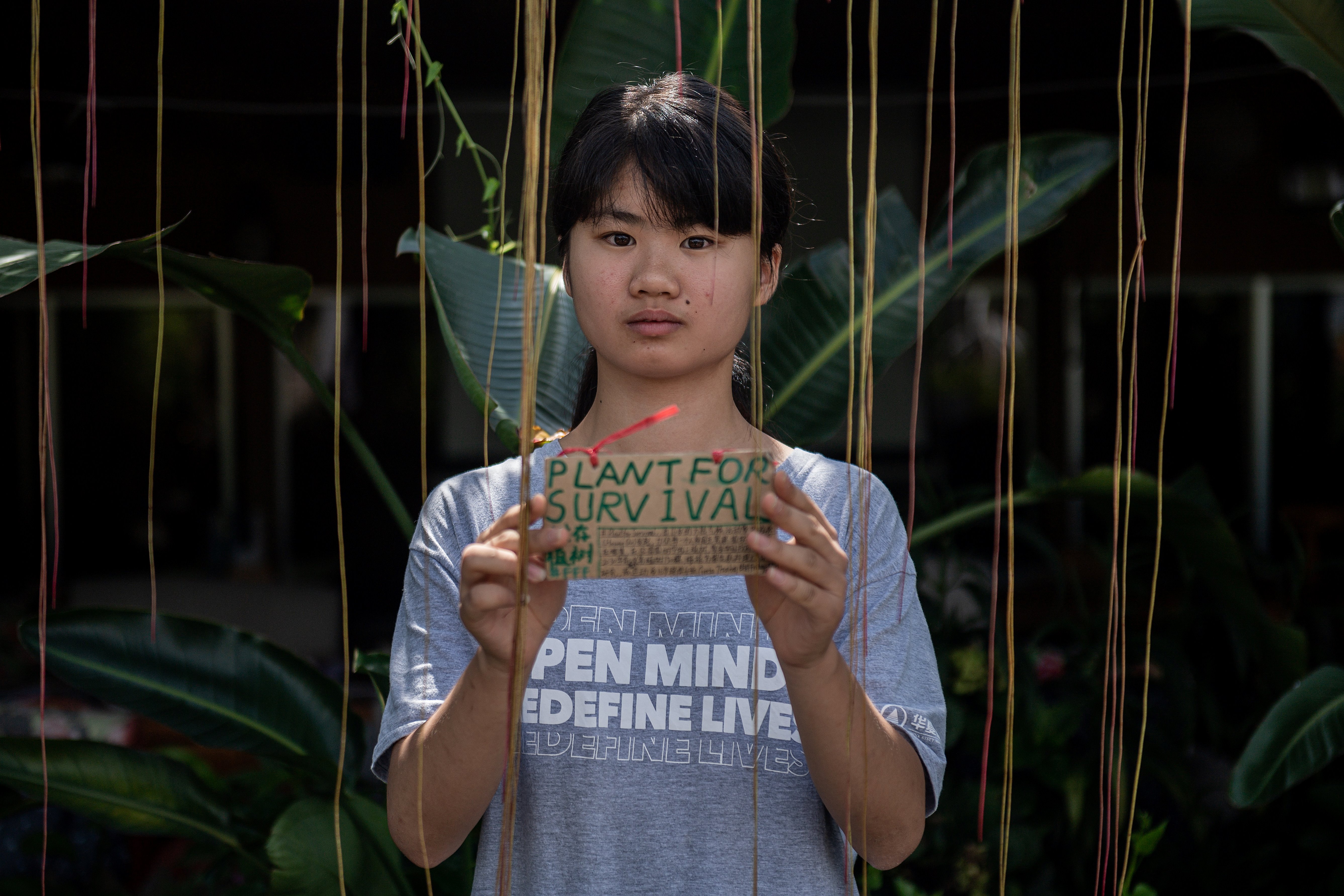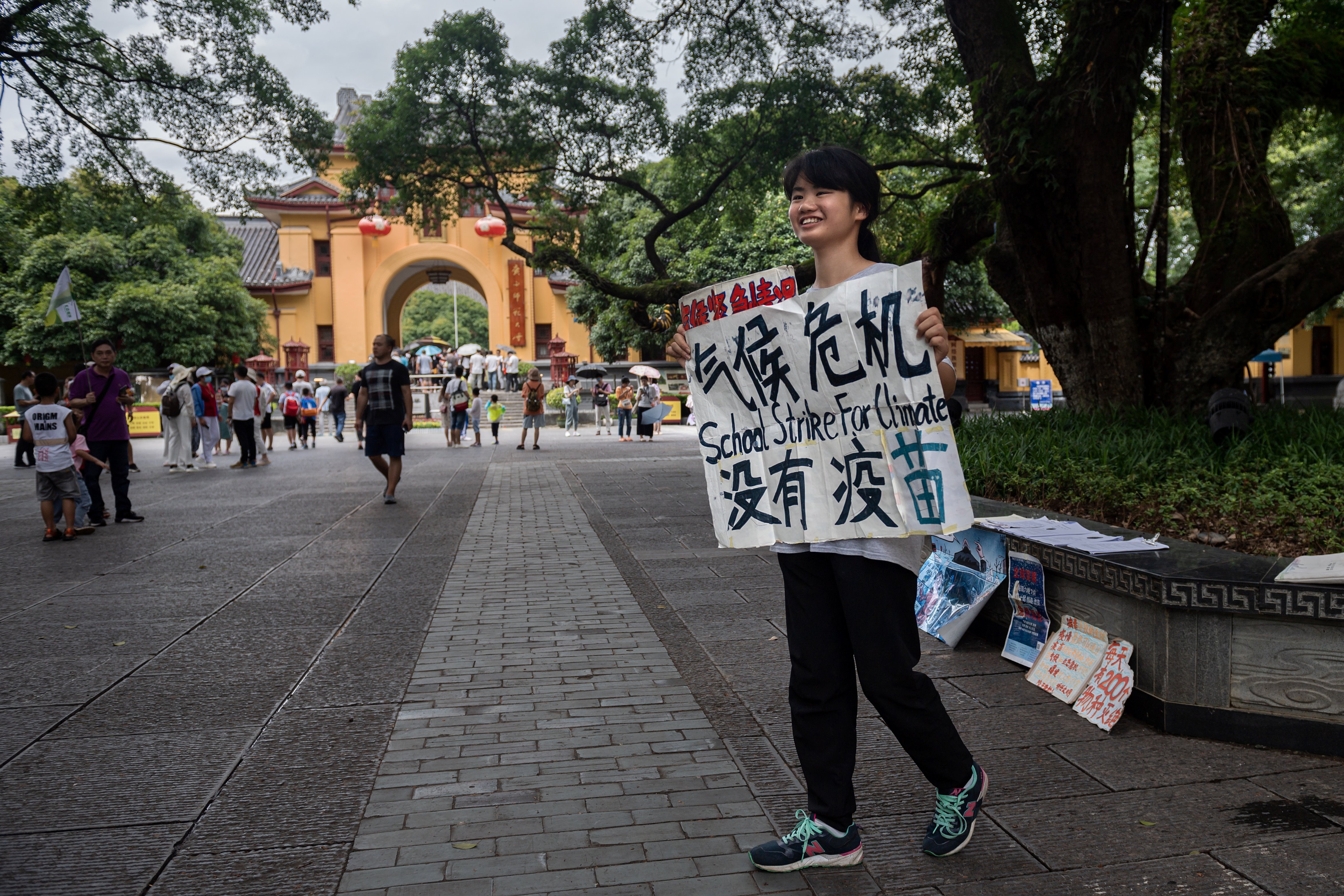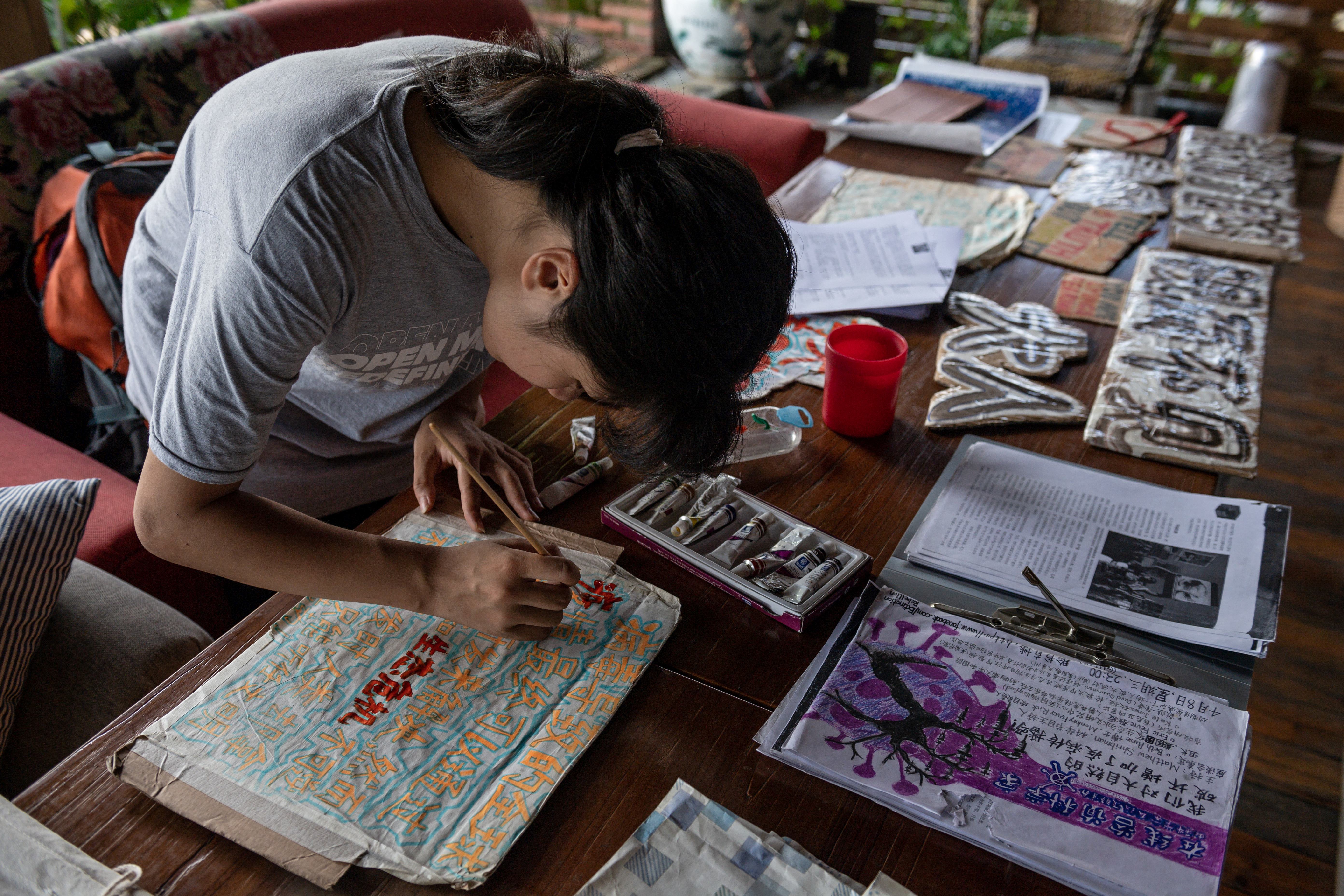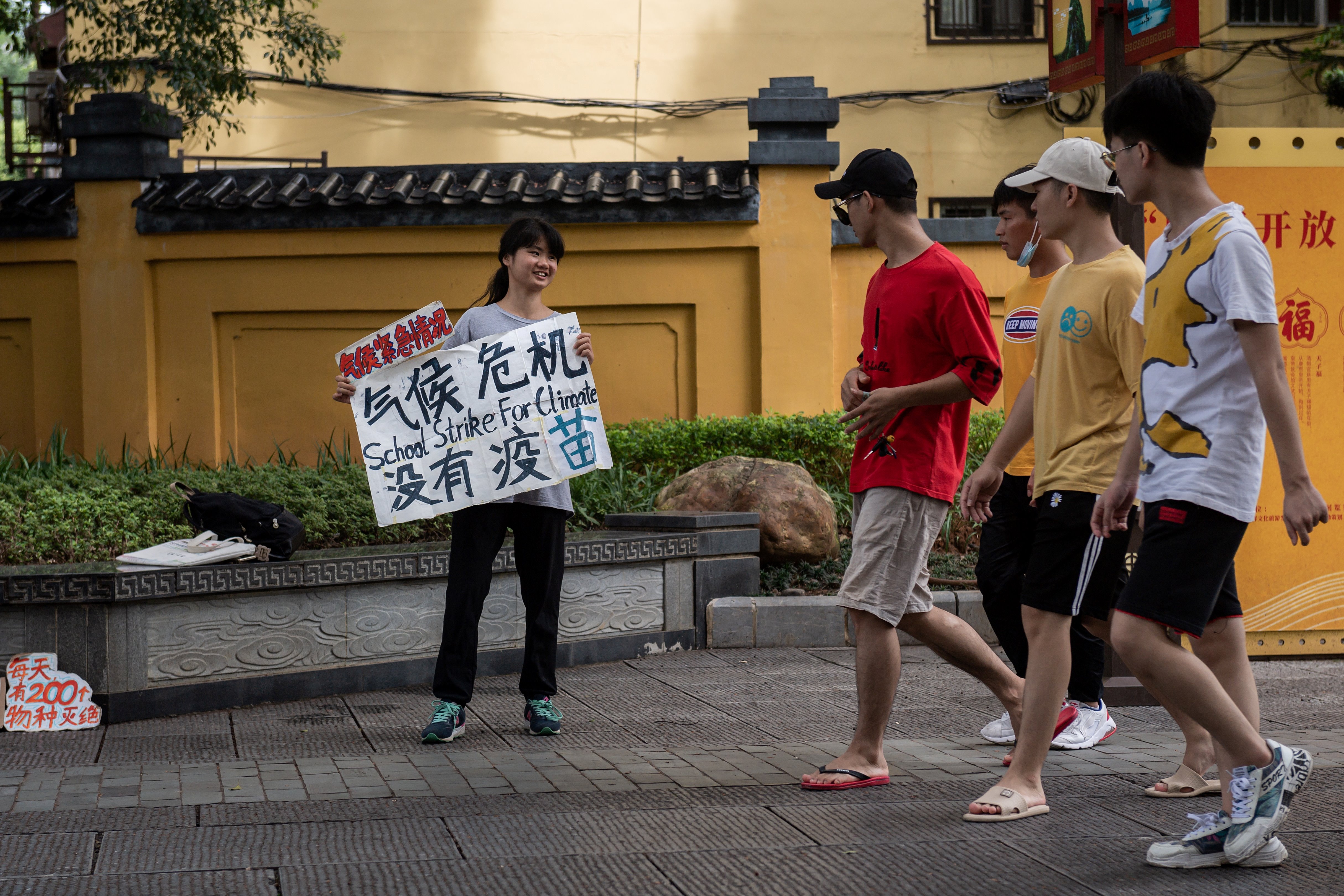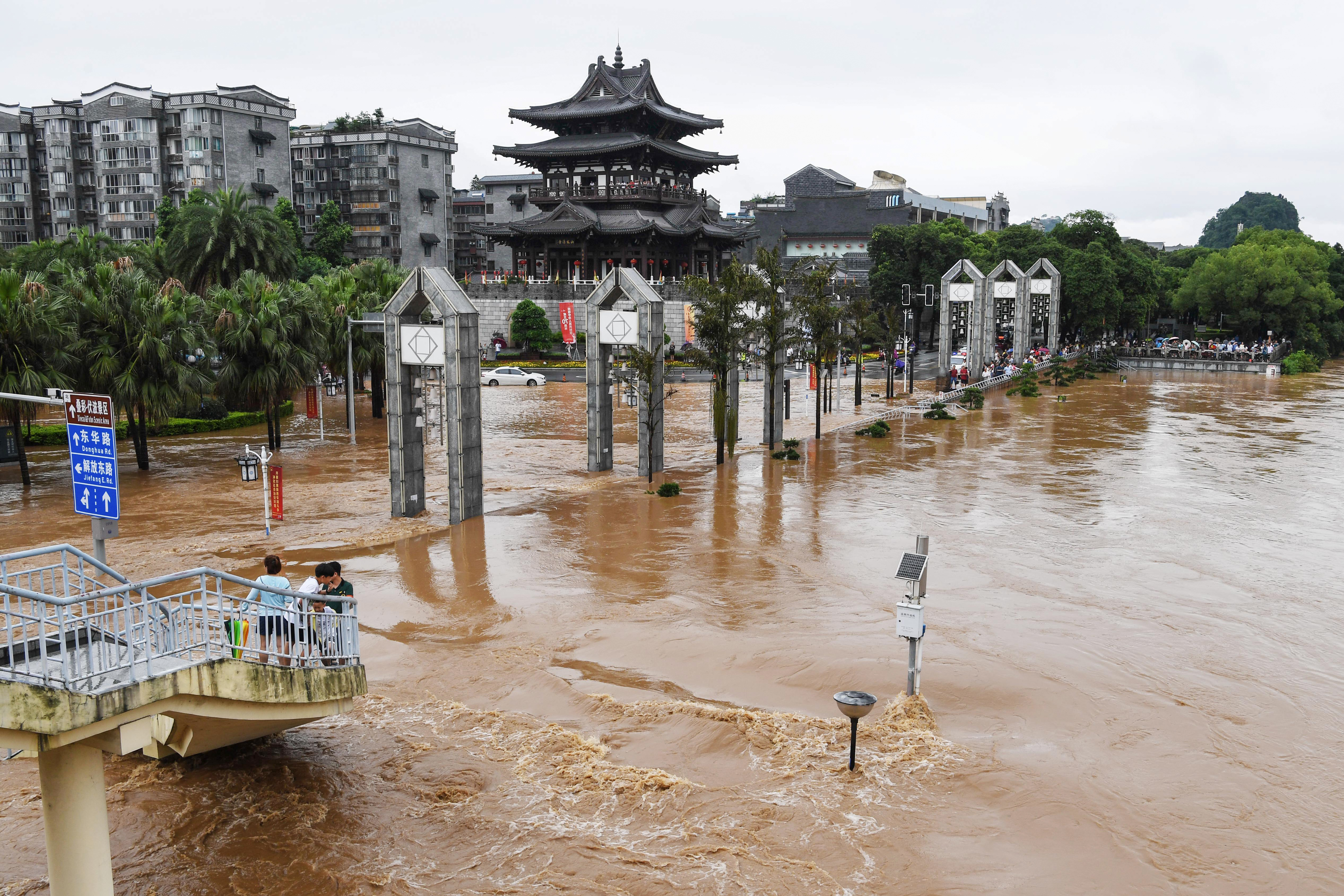Fighting Alone for Climate Action in China: Meet Teen Activist Howey Ou
September 25, 2020It’s time to wake up. On Global Climate Day of Action, VICE Media Group is solely telling stories about our current climate crisis. Click here to meet young climate leaders from around the globe and learn how you can take action.
Teen activist Howey Ou fights for environmental change in China, her home and the world’s biggest polluter. The country, with its fast-growing population and superpower economy, holds the record for being the world’s worst carbon emitter, overtaking the United States to produce a whopping 11.7 billion metric tons of heat-trapping greenhouse gases. This is more emissions than the U.S. and Europe combined.
For the 18-year-old activist, who goes by her Chinese name Ou Hongyi, this is a frightening scenario, one which she said worried and angered her but also served as an important wake-up call.
“It made me question how a country like mine, with a population of more than 1.4 billion, did not have a single young person who was willing or brave enough to stand up and speak out against horrible environmental destruction that’s taking place,” Ou told VICE News.
Her environmental awakening began when she was a little girl growing up in Guilin, a small southern Chinese city famed for its lush green mountains, freshwater rivers, and dramatic limestone peaks. Nature and a love for animals shaped Ou’s values and beliefs and would later inspire her to set off on a life-changing mission.
In May 2019, Ou staged her very first climate action strike in front of local government offices and was catapulted to global prominence. It lasted for seven days before officials found her and took her to a police station. This attracted the attention of fellow youth activist and Fridays For Future founder Greta Thunberg, who hailed Ou a hero and praised her efforts and dedication to the climate fight in China. But unlike Thunberg who has gone on to achieve global status and recognition, Ou is fast-discovering that her brand of green activism isn’t as welcome or well-received at home, in China, where public criticism and dissent are viewed as official acts of defiance — and harshly punished.
Speaking to VICE News, she talked about her dedication to the planet, the rewards and challenges of taking part in the environmental movement, the anxiety and loneliness she often feels because of it, and why she hasn’t looked back since.
VICE: Hello Howey! You made global headlines by staging a solo climate change protest outside government buildings in Guilin, China. Can you tell us what that day was like?
Howey Ou: It took many days of planning and soul-searching before I made the decision to stage a protest. I did a lot of online research beforehand about the climate change battle as I wanted to be fully prepared. I came up with catchy slogans and sentences — with the intention of grabbing attention and shocking passersby — and wrote them down on big boards which I took with me to City Hall on the afternoon of May 26, 2019.
Day one was uneventful. I was on my own and didn’t spend a very long time at my first location but I made it a point to take a picture, like how other young protesters around the world do, before I moved on to nearby streets. I then shared the picture on Twitter and received a modest response, which inspired me enough to keep going. Before I knew it, I was into my second and third day of protesting.
I eventually took my best friend along and we met a guard outside one of the local government buildings. At first I was a little worried that we would be stopped but he turned out to be very kind and gave us some advice. He told us that we would be better prepared if we had some proposals to hand out to officials. I left feeling hopeful.
I decided to press on and returned to City Hall. I would sit outside every day for three to four hours. I documented all my movements on Twitter and soon I received a notification telling me that Greta Thunberg had retweeted one of my posts. I noticed that my followers began to steadily increase. I began to gain traction not just on Twitter but also in real life.
I caught the attention of plainclothes police officers, who gave me two options: either return home or go with them to the station. I didn’t want to go home because I saw that as a defeat so I went along with them peacefully as I felt it was a good show of peaceful and unyielding resistance.
How do you approach climate activism? What are your tactics?
My Twitter bio reads: “You can develop vaccines for COVID-19 but there is no vaccine for climate emergency.”
Civil disobedience protests are the way to draw public attention to the climate crisis that is already unfolding. It’s also important to know how best to strike a balance, saying positive and empowering things as well as presenting the hard scientific facts. We need to remain hopeful and use our courage to empower others to want to do the same. We also need to be tactful in dealing with challenges because it can be a desperate situation. This is the only way to tackle the crisis and create public awareness. History shows us that.
I also constantly tell myself that I would need a lot of energy if I was going to do this alone — it’s a constant dilemma that I face. If we can’t mobilize enough people to wake up and make changes happen through collective action, then our civilization is doomed. There is no turning back and now is the chance for us to make a difference.
Tell us about your experience with the police in China.
I was taken to a central police station where I was led into a small room and told that it would be a formal interrogation. They had papers [on hand] and a computer to record my statement. The officers asked me to cooperate and tell them everything I knew. They asked a lot of questions, like how I came to know about climate change and why I felt the need to protest every day. They also asked about the people who stopped to talk to me in the streets. They told me that “there was no need to lie.”
They also seemed to know a lot about me and even had details about my friends — that was when I knew it wasn’t an innocent chat. I finally understood that these were officers from the national security bureau and realized that it wasn’t a casual arrest.
They lectured me and said that what I had done in front of the government buildings was illegal. Looking back, I think they probably felt threatened and wanted to stop people like me from spreading messages that speak ill of the government and the country. It was their way of controlling information and stamping out resistance. It’s all about authority. They weren’t concerned about science or the planet at all.
The entire session lasted for more than an hour. It was close to midnight when I was finally released. My parents were there to pick me up and were really worried. The police officers told them not to allow me to post anything on Twitter or speak to foreigners or journalists.
What happened after that?
It was a warning of things to come. We lost internet connection at home for three days and my mobile number was suspended. The interrogation continued, with police phoning my parents for several days at their workplace. The whole thing created a rift between my parents and me.
Your father previously expressed concerns about your activism, saying he was afraid it would end up hurting your future.
Yes. My parents don’t feel that protests are wise and would rather that I focus on school. Ever since that happened last May, my parents and I have had intense conflicts at home. At one point, they even took away my phone and electronic devices. It was really frustrating and exhausting. I ended up leaving home for a while and wandered around the country for a few months. I visited some research centers to continue my climate change work because I felt I could not do so in an embattled home environment. I’m currently living on my own, away from them, and I’m not sure about what will come next.
We also read reports that you were stopped from attending school. What’s the situation like now?
There was a lot of international media coverage about my plight and since then, my school has allowed me to return to finish my studies.
I can go to school now but I can tell that my teachers are still very hesitant about my activism and are probably feeling pressure from the local education ministry and the national security bureau about my public profile. Like my parents, they are in a difficult position. I need to consider my education seriously because if I choose to return to class, I cannot quit and I’m finding it all very frustrating.
Why do you say that climate change can be a lonely fight in China?
I’ve largely been operating alone to spread my messages about climate justice and don’t have the same support networks that young activists in other countries get from community movements.
I’m no stranger to being silenced but my activism is often questioned. Many NGOs in China are funded by the government, they tend to be more moderate and wouldn’t aggressively challenge the government so I’ve been alienated in the local environmentalism circles and have been excluded from events and conferences about climate change in China.
But I do know another Chinese climate activist named Zhao Jiaxin, and I’ve spoken with other Fridays For Future activists — but none in China. I also look to my peers as well as Chinese animal rights activists for support. They told me to ignore fears of imprisonment and gave me a lot of encouragement.
Twitter is a great platform and I’ve received invaluable support from other inspiring activists from places like New Zealand and Australia and closer to home in Asia like Japan, Taiwan, and Hong Kong. It’s an amazing community, one that gives me hope and the confidence to carry on my fight.
Some foreign groups and world leaders have praised the Chinese Communist Party (CCP) for trying to combat climate change. Why do you say it can still do better?
Billions of people will die because of the climate crisis and world leaders aren’t doing enough or taking it seriously. Our government in China silences scientists and even resorts to hiding facts from the public, many who believe that President Xi Jinping and the CCP are doing a good job.
It’s wrong when politics bleeds into climate action and it’s a bigger crime when activism is silenced. And when one prioritizes money over saving the planet, you’ll find that there will be people, especially in powerful high-level positions, who refuse to see the truth.
Take for example Chinese companies that are allowed to get away with slaughtering wildlife and destroying nature. Chinese fishing vessels are still entering protected international waters to slaughter sharks and other marine sea creatures. It shocks and infuriates me. It is a terrible ecological crime because their selfish actions only serve to accelerate the destruction of such fragile ecosystems. Worst of all, this isn’t a one-off incident, it happens a lot.
China’s actions have a great global impact on the world. Whether such atrocities take place in the country or not, Chinese companies need to be held accountable and punished. We need stricter laws to protect our environment and not allow such greed to take place at the expense of our planet.
But I think the bigger problem in China is widespread apathy among the public. Lots of people don’t realize that we are in the middle of a very big and dangerous climate emergency.
They believe that their government is doing a good job and there are many others who still don’t care about it or believe in science. The lack of inaction and stubborn disbelief makes me very worried and angry. It can feel like I am fighting a hopeless battle.
In your opinion, who are the ones suffering the most from climate change and environmental destruction?
The most vulnerable people in society are often the ones who suffer the most, namely poor farmers and fishers. I actually visited a few villages in the countryside and found it really sad and frustrating to see how their lives have been uprooted and destroyed by floods and other disasters.
Families told me how hopeless they feel, that they have no power to change the situation and don’t know how to prevent future disasters. They feel that their government has failed them and don’t know what they can do or where they can turn. And that’s where I come in — to demand change from the government through civil disobedience.
I am also concerned about the evident climate change in the Tibetan Plateau. It’s an important and strategic water source for billions of people and temperatures there are rising faster than anywhere else in Asia.
Lots of media outlets often compare you to Greta Thunberg. How do you feel about this?
I first heard about Greta on the Chinese internet when people were sharing posts about her after she skipped school to protest about climate change. It was a big talking point. Her actions resonated with me and made me want to get involved. She plays such an important role in the global fight against climate change. The world wouldn’t be having these important discussions today if it wasn’t for her voice and campaigning.
Seeing young people taking to the streets, united by science and a rallying cause, to demand impactful change from world leaders is truly inspiring. Greta played a big part in that. We both started out protesting on our own and I admire her courage a lot, so it’s an honor to be compared to her.
How did you get involved with Greta Thunberg’s Fridays For Future movement?
Growing up in China, I didn’t see protests in person and only managed to learn about them much later in life through the internet. That was where I read about Greta Thunberg and her movement — I wanted to be part of it.
I spent hours reading up and searching, and found the movement’s official website. I saw long lists of names from different countries but none from China and wondered how that could be.
How can a country like China — with one of the world’s largest populations that also holds the worst carbon emissions record — not have a single young person willing to stand up and fight against climate change and the government?
I couldn’t believe that. I was shocked and angry but at the same time, felt really determined to be part of the Fridays For Future movement. I needed to get in touch with like-minded young people in China and if there was really no one, then someone had to take the first step and responsibility to join the campaign. And that person was me.
Did I want to look back on this pivotal chapter in history in 30 years time and regret not standing up and doing the right thing? How there were millions of young environmentalists out there in the world, marching for a better and safer future, but no one to fight for environmental change in China?
That was what I told myself and it gave me a lot of courage.
I reached out to people in the U.S. and Europe using a local study app and asked if they could connect me with activists from Greta’s movement. In 2019, I received an official invitation to join the Fridays For Future movement. I was hesitant at first because I knew that it would take up a lot of energy if I was going to do this alone and there would be great challenges. But my hope outweighed the doubts I had and I joined and haven’t looked back since.
How has your activism influenced your everyday life?
I gave up meat two years ago and have been vegan for quite some time. I once dreamt that I had to kill a fish and the thought horrified me — I couldn’t go through with it. I love animals too much and strongly oppose cruelty to them, so I do not agree with industrial farm practices that exploit, torture, and slaughter them for profit. That was why I decided to give up consuming eggs and milk too. Overall, I find that a meatless diet is not only better for my health but for the environment too.
It was a choice I struggled with for many years. Growing up in China, you are often raised on meat so my parents didn’t approve of my decision to give it up. But eventually, they came around and understood where I was coming from. Now they don’t eat meat. Some of my friends also became vegetarians too and I’m very proud of that.
This interview has been edited for length and clarity.

